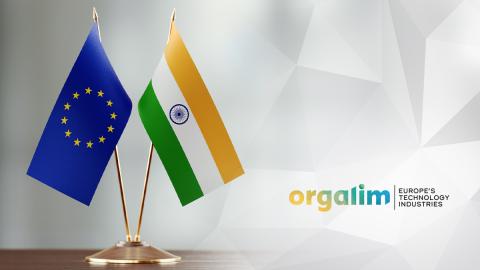Orgalim priorities for future EU-India trade relations
20 October 2021

On 8 May 2021, the EU-India Summit took place, agreeing to resume negotiations on a Free Trade Agreement (FTA) and to launch negotiations on a stand-alone investment protection agreement. This is an important topic for Orgalim’s members as the annual value of EU-India trade for Europe's technology industries’ products is €13 billion. In this context, we support the speedy resumption of the negotiations and have summarised hereafter the key priorities for a potential EU-India FTA.
1. Tariffs and Rules of Origin
Market access should be enhanced for Europe’s technology industries, and industrial tariffs between the EU and India should be eliminated as soon as possible. These tariffs for our sectors are 7.5% on average, in addition to other duties, levies and taxes imposed by Indian authorities. We support Rules of Origin with flexible cumulation, entailing a change of Harmonised System heading (or, alternatively, the 50% value-added rule).
2. Technical barriers to trade
We support a regulatory cooperation mechanism to minimise technical barriers to trade in the future. A first concrete example that is concerning to our membership is a proposed Indian regulation that requires registering our products in a database before being imported into the country. This would increase bureaucracy and put some sensitive information of companies at risk. A second example is the fact that the Indian Government has introduced an equalisation levy on e-commerce transactions, affecting the overseas supplier of goods and services.
We also emphasise the need for any FTA to refer to the internationally recognised and consensually created technical standards of the International Organisation for Standardisation (ISO), the International Electrotechnical Commission (IEC) and the International Telecommunication Union (ITU) to harmonise technical requirements. When a product complies with internationally recognised standards, it should not undergo mandatory quality certification from the Bureau of Indian Standards (BIS) and other agencies’/Departments’ certifications.
3. Access to public procurement and foreign direct investment
Access to public procurement at all administrative levels should be covered by the future EU-India FTA. Moreover, requirements on foreign direct investment by European companies should be eased. The requirements that online sales are permitted only if a company wholly owns at least one branded store should be lifted. Also, the rule foreseeing that investment in single brand retail stores is possible only if 30% of products/goods components are sourced locally over five years should be lifted.
4. Illegal state subsidies
Illegal state subsidies should be tackled in the future EU-India FTA.
5. Protection of Intellectual Property Rights (IPR)
Protection of Intellectual Property Rights (IPR) should have a strong chapter in the FTA. In particular, market surveillance should be stepped up in India to fight against IPR infringements.
6. Authorised Economic Operator (AEO) status
Mutual recognition of Authorised Economic Operator (AEO) status for eligible companies should be granted, given that India and the EU have similar AEO programs. We call on both sides to continue focusing on reinvigorating a strong and productive relationship and to reach an EU-India agreement on trade as soon as possible.
Orgalim, on behalf of Europe’s technology industries, stands ready to support the FTA negotiations to strengthen EU-India relations. If you have questions, please contact our Senior Trade and Legal advisor Silvia Selandari.

LATEST NEWS
How can we create a dynamic, competitive European high-tech manufacturing base?
Orgalim's key recommendations offer policymake...
